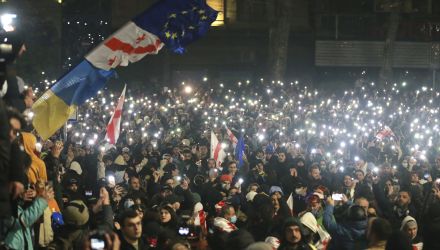France and Germany are making life difficult for President George W. Bush but heated rhetoric is making matters worse. To dismiss them as the "old Europe" is tactically and factually a mistake. Indeed, it is the very newness of the French-German relationship that has enhanced their power.
Between 1870 and 1945, three wars tore Europe apart. Today war between these former enemies is unthinkable. From the coal and steel community created after the second world war to today's European Union, Franco-German co-operation has created something unique in world history. The union is not a new nation state with a mighty army. The Europeans are not all in the same sovereign boat but the national boats are lashed together into an island of stability that is sui generis and powerfully attractive to its neighbours. Witness the desire of central Europeans and Turkey to join it.
Some American sceptics complain about "Euro-wimps" who lack the resources and will to fight or even to develop a common defence policy. Because Europe has less military power, we hear that Europeans are from Venus while Americans are from Mars. But such clever cliches obscure important differences. After all, Britain, Italy, Spain and Denmark as well as the "new" Europeans have indicated a willingness to use force in Iraq. And within countries, a recent poll by the Pew Charitable Trust showed that there are many Europeans with "American" views on policy and many Americans with "European" views.
Even more important, the sceptics have a myopic view of power that focuses too heavily on the military dimension, where the US excels. But power in the 21st century is distributed differently on different issues and resembles a three-dimensional chess game. On the top board of military issues, where US military expenditure is equal to the next two dozen countries combined, the world is unipolar. There is only one superpower. It is likely to remain that way unless Europeans want to double the proportion of gross national product spent on defence to equal US levels. But even more modest European capabilities should not be discounted. European participation in a coalition against Iraq helps the legitimacy of the US cause and European nations could play a crucial role in the aftermath. There are more European than US troops helping to keep the peace today in the Balkans and in Afghanistan.
The middle board of economic issues is a sharp contrast from the military board. Here the world has a multipolar balance of power. The US cannot achieve a global trade agreement without the agreement of Europe and others. In the area of antitrust, General Electric was unable to merge with Honeywell because the European Commission opposed the move. And recently, Microsoft had to make significant changes to its new passport system in order to meet European privacy regulations. This is hardly the "American hegemony" that some proclaim. Moreover, despite the political popularity of the US in Donald Rumsfeld's "new Europe", the US is becoming less prominent in business and investment there. EU countries account for three-quarters of the "new Europe's" trade.
The bottom board of the three-dimensional chess game consists of transnational issues that cross borders outside the control of governments. Examples include illegal migration, drugs, crime, the spread of infectious diseases, global climate change and, of course, transnational terrorist networks. On this board, power is chaotically organised and it makes no sense to speak of unipolarity, hegemony or American empire. While these issues are having an increasing effect on the lives of ordinary Americans, they cannot be solved by military power or by the US acting alone. Co-operation with other countries, particularly the capable Europeans, is essential to Americans' ability to get the outcomes they want. Europe is not likely soon to become the military equal of the US but it has enough sticks and carrots to produce significant hard power, the ability to get others to do what they would not otherwise do. In addition, despite internal divisions, Europe's culture, values and the success of the EU have produced a good deal of soft power, the ability to attract rather than merely coerce others.
Despite policy differences over Iraq, no two parts of the world share more of the basic values of democracy, liberty, tolerance and human rights than do Europe and the US. Mr. Bush and President Jacques Chirac should cool the exaggerated rhetoric that obscures these similarities and the importance of working together. France should think again before producing a train-wreck by using its veto in the United Nations. And US unilateralists should remember that those who focus on only one board in a three-dimensional game are likely to lose in the long run.
Nye, Joseph. “Europe is too Powerful to be Ignored.” Financial Times, March 11, 2003





